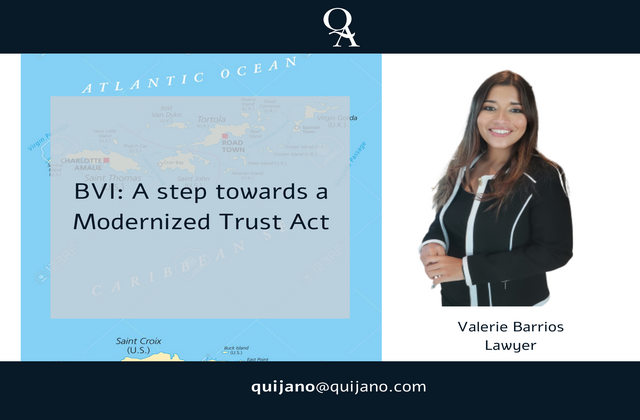BVI: A step towards a Modernized Trust Act

Introduction
The British Virgin Island (“BVI”) established the trust concept with the enactment of the BVI Trustee Act in 1961 (“Trustee Act”). A trust as defined within the Trustee Act is a legally binding arrangement whereby a person (known a settlor) transfer assets to another person (known as the trustee) who is entrusted with legal title to the trust assets, not for his or her benefit but for the benefit of a third party (known as the beneficiary) who often includes the settlor or a specific purpose. All directives from a settlor to the trustee are included in a document known as the trust instrument. The trust instrument is a private document for the settlor to include all powers of the parties, indicates all wishes of management and disposition of the trust.
Trust System in the BVI
The BVI is heavenly influenced by English Trust Law, but nevertheless has move beyond to allow perpetuity period of 100 years and most notably to create the commonly known “VISTA TRUST that will later be discussed. As mentioned previously the current legislation in the BVI in regard to trust are contained in Trustee Ordinance Act 1961 (“the Trustee Act”) (most recently updated by the Trustee (Amendment) Acts of 2013 and 2015) and is supplemented by the Virgin Islands Special Trusts Act 2003 (the “VISTA legislation”) (most recently updated by the Virgin Islands Special Trusts (Amendment) Act 2013).
All trust in the BVI is exempt from registration under the Registration and Records Act and all trustees are exempt from reporting and filing requirements to the high degree of confidentiality. In view of the foregoing, trust remain as a private agreement within the parties involved. A trust is protected by companies carrying a license under the Banks and Trust Companies Act of 1990.
The components of a Trust
| Person | Settlor | Trustee | Beneficiaries | Trust Fund | Protector |
| Definition | Creator of the trust and divest themselves from legal ownership of the trust assets. | Legal title is invested to the individual under obligations imposed by the trust | Persons entitles to benefit from the assets within the trust. | Assets included once the trust has been created. | Person assigned to administrator but can only do so with the consent of the trustee |
| Can they act as a beneficiary | Yes, but cannot act as sole trustee or sole beneficiary | No, | Yes, they are appointed and can enjoy equal or unequal benefit states in the trust arrangement | N/A | N/A |
| Role | Retain degree of control Remove and appoint trustees Revoke the trust at any time. | Act as administrators of the trust. Does not have to be a BVI resident | Receive benefits included in the trust and/or powers set for each beneficiary | Assets established in a trust with nominal value that can include personal or real property | Determine the law of the jurisdiction for the trust Remove trustees Appoint new or additional trustees Withhold consent from specified actions of the trustees either conditionally or unconditionally |
Forms of Trust in the BVI
The BVI has created an ample array of forms of trust to favor the use of the parties depending on the circumstances and powers granted.
| Fixed Interest Possession Trust | A trust whereby the main beneficiary will grant a vested interest in the income of the trust fund throughout his or her lifetime and the discretion of the trustee is limited. |
| Accumulation and Maintenance Trust | No beneficiary has fixed entitlement to the benefits in the trust for a certain period of time, during this period the income is accumulated and becomes an accretion to capital. The trust instrument may include powers to make distributions amongst the beneficiaries up to a specific age. This trust benefits settlors looking to benefit children and future grandchildren. |
| Discretionary Trust | Known to be the most efficient structure between a settlor and beneficiaries as the trustee is given ample discretion as to when, how much and which beneficiaries are distributed the income and capital within the trust. |
| Revocable Trust | A settlor can revoke the trust and use the return of the trust fund. |
| VISTA Trust | VISTA legislation created the special trust in the BVI which exists to purely hold shares of a BVI company. The trust enables the trustee to distance themselves from the management of the company where the shares are held. The trustees must contain an authorize license to act as trustee. (Banks Trust Companies Act 1990) |
Enactment of Trust amendment 2021
The Trust Amendment 2021 (Amendment) was announced on the 9th of July 2021 driving a significant change to the law in respect to trust. The amendment has modified legislative provision governing BVI trust that include a strive to modernize and strengthen the BVI trust offering. The Amendment Act has brought forth the main key changes that will be discussed below.
- According to Section 58 and 59 of the Amendment, the court can approve arrangements on behalf of various categories of person ho are unable themselves to provide approval (ex minors, unborn children, and unascertained persons). The court will only approve changes if they see not detrimental to the interest of those on whose behalf it is approving it and it cannot provide approval for adult’s beneficiaries. The current modification allows the interest of an adult beneficiaries to be changes by the court without their consent. As a practitioner this creates a disadvantage to the essence of why individuals establish a trust. The trust is a private document between parties and the courts by allowing them to modify the interest to their pleasing dismantles the privacy of a trust. An advantage that other practitioners have mentioned is the closing of a gap when an adult beneficiary cannot provide consent. Cases such as multiple beneficiaries in a trust and those with a minority interest
- Section 59A in the Amendment introduce a statutory framework for the setting aside of the exercise of fiduciary powers on the grounds of inadequate deliberation by trusteed or any other power holder (Ex BVI director of a company, beneficiary of a trust). The new clause allows to consider 1) whether in exercising their powers, the power holder did not consider one or more considerations of fact or law, or both that were relevant to the exercise of the power, or simply took one or more such consideration. In addition, in must consider 2) failure, of the power holder to exercise fiduciary powers with the effect that it will be treated as having never occurred. With the new Amendment a BVI Court today is empowered to set aside the exercise of a fiduciary power with the effect that it will be treated as having never occurred. The BVI Court can also make such consequential order as it sees fit.
- Section 83A in the Trustee Act protected the trust which are governed by the BVI law which are being attacked because of foreign law concerns a party with an interest in the trust assets by virtue of their personal relationship. The Amendment in the other hand, has extended the reference of “personal relationship to the settlor” to include a personal relationship to any beneficiary and personal relationship including stepchildren, or children born by means of artificial fertilization or surrogacy. Article 83A extends the element that protects against a foreign law applying to a BVI trust so that all questions arising are to be determined exclusively by BVI law.
Conclusion
A trust is a private structure that BVI has adopted by common law. The recent reforms are a positive step toward the modernization of the trust legislation in the BVI that will ensure that BVI maintains as an appealing jurisdiction to continue and do business and structure ones wealth. The innovation should attract those who look to establish a trust, or who have already established a trust in other jurisdiction.




